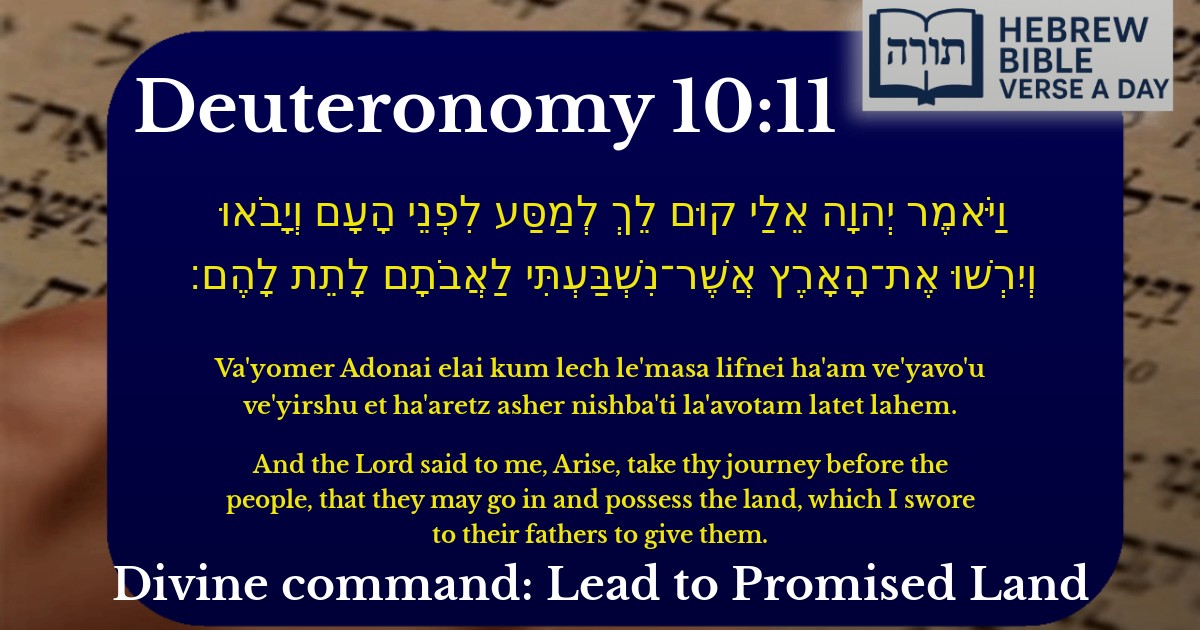Join Our Newsletter To Be Informed When New Videos Are Posted
Join the thousands of fellow Studends who rely on our videos to learn how to read the bible in Hebrew for free!
Hebrew Text
וַיֹּאמֶר יְהוָה אֵלַי קוּם לֵךְ לְמַסַּע לִפְנֵי הָעָם וְיָבֹאוּ וְיִרְשׁוּ אֶת־הָאָרֶץ אֲשֶׁר־נִשְׁבַּעְתִּי לַאֲבֹתָם לָתֵת לָהֶם׃
English Translation
And the Lord said to me, Arise, take thy journey before the people, that they may go in and possess the land, which I swore to their fathers to give them.
Transliteration
Va'yomer Adonai elai kum lech le'masa lifnei ha'am ve'yavo'u ve'yirshu et ha'aretz asher nishba'ti la'avotam latet lahem.
Hebrew Leining Text
וַיֹּ֤אמֶר יְהֹוָה֙ אֵלַ֔י ק֛וּם לֵ֥ךְ לְמַסַּ֖ע לִפְנֵ֣י הָעָ֑ם וְיָבֹ֙אוּ֙ וְיִֽירְשׁ֣וּ אֶת־הָאָ֔רֶץ אֲשֶׁר־נִשְׁבַּ֥עְתִּי לַאֲבֹתָ֖ם לָתֵ֥ת לָהֶֽם׃ {פ}
Parasha Commentary
📚 Talmud Citations
This verse is not quoted in the Talmud.


Context in Sefer Devarim
This verse (Devarim 10:11) appears in Moshe Rabbeinu's recounting of events after the sin of the Golden Calf. Rashi explains that this directive follows Hashem's forgiveness of Bnei Yisrael and the restoration of the second Luchot, marking a renewal of the covenant and the resumption of the journey toward Eretz Yisrael.
The Command to "Arise and Journey"
The Ramban notes that the phrase "קוּם לֵךְ לְמַסַּע" ("Arise, take thy journey") carries special significance. Unlike earlier commands where Hashem would specify when to travel via the cloud (Bamidbar 9:17-23), here Moshe is given direct instruction to initiate movement, indicating a shift to proactive leadership in preparation for conquest.
Leadership Role Before the People
The Oath to the Forefathers
The phrase "אֲשֶׁר־נִשְׁבַּעְתִּי לַאֲבֹתָם" ("which I swore to their fathers") is emphasized by the Midrash Tanchuma (Eikev 3) as a reminder that the merit of Avraham, Yitzchak, and Yaakov - not the people's own righteousness - was the primary basis for inheriting the land. The Kli Yakar connects this to the earlier verse about Moshe's successful prayer (Devarim 10:10), showing that ancestral merit combined with current leadership facilitated the divine promise.
Halachic Implications of Possession
The Rambam (Hilchot Melachim 5:1) derives from this verse that settling Eretz Yisrael is a mitzvah incumbent upon all generations, as the original oath to the Avot was eternal. The Netziv in Ha'amek Davar notes that the verb "וְיִרְשׁוּ" ("and possess") implies both physical conquest and spiritual acquisition through establishing Torah life in the land.